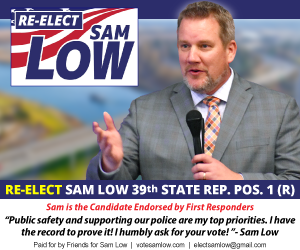By: Erin Freeman | Lynnwood Times Staff
At the May 26 business meeting, the Lynnwood city council voted and approved 4-3 on the elimination of the city of Lynnwood’s 6% utility tax elimination on water distribution in sewage utilities. The ordinance was originally proposed by councilmember Jim Smith during the May 11 business meeting, who stated that its repeal would provide economic relief to Lynnwood residents amid coronavirus-induced financial impacts.
“I know it seems like just a little bit of money from each household, but those struggling make a big difference; It matters a lot to the individuals,” explained councilmember Smith.
Finance Director Sonja Springer expressed concern with the budget impact of the permanent elimination of the utility tax, calling it “ financially devastating to the general fund” as it would reduce revenue to the general fund by about $150,000 a month, totaling $1.4 million per year. Springer also noted she was warned by financial advisors that it will affect the city’s ability to pay back current debt and could likely result in a decline in bond rates.
After a discussion about the timing of the impact on the city’s finance streams due to the uncertainty of the financial impacts of COVID-19, the council amended the motion to be proposed effective as of January 1, 2021. The council then passed the ordinance of the elimination of the water and sewage runoff bill 4-3 in a roll call vote.
Just two days following, in a veto-message sent to councilmembers on May 28, Mayor Smith announced she was vetoing the ordinance that elimination of the 6% tax. In the letter, she wrote that although originally brought up to provide financial relief for residents during COVID-19, the revision of the ordinance and process of its approval went against the city council’s restrict- ed capacity to solely discuss matters related to the pandemic outside of routine and essential business matters.
“Repeal of the City’s 6% utility tax on the City’s utilities was introduced as a way to provide financial relief to the community during this pandemic, ‘’ stated Mayor Smith in her veto-message. “Lacking any strategy to offset the serious impacts on the City’s finances during 2020, the City Council chose to delay the effective date of the Ordinance to January 1, 2021, which is outside of the COVID-19 emergency response timeframe. It is inaccurate to portray this anti-tax measure as COVID-19 relief.”
In the veto-message, Mayor Smith also brought up that during the previous business meeting on May 26, the council had expressed support of the city’s plans to apply federal CARES Act funds to create business and community relief programs. During the
May 26 meeting, the council had been joined by Public Information Officer Julie Moore, who confirmed the city of Lynnwood’s eligibility to receive up to $1,188,000 in Federal CARES Act funding to address COVID-19 related response expenses. $700,000 of which is now planned to be allocated towards business and community relief funds, as of the June 8 business meeting.
However, the morning of the June 8 meeting, councilmember Jim Smith sent a letter to the council responding to Mayor Smith’s veto of tax relief, saying he was discontent with her decision to veto “a very small tax relief ordinance to aid the struggling people of Lynnwood.” Smith continued, pointing out that while the city expects to receive up to $1.188 million in CARES Act funds, only about $200,000 it planned to be specifically allotted to a community relief fund to go directly to financially supporting community members.
Then, during the June 8 city council business meeting, councilmember Jim Smith made a motion to override Mayor Smith’s veto, seconded by councilmember Ian Cotton.
In a round-robin style, councilmembers commented on the Mayor’s decision to veto the approved ordinance. Councilmember George Hurst, who had voted in favor of the removal of the utility tax, responded to the Mayor’s statement that the repeal of the tax falls short of the orders to address matters specifically in response to COVID-19, saying the intention was of a responsive government, stating “it was in reaction and still is to COVID-19 to o er some relief to residents.”
The city council then voted 4-3 to reverse Mayor Smith’s veto, not enough to override it. The council would have needed at least 5 votes.
Mayor Smith responded to the failure to override the veto, saying that she appreciates the council’s e orts to soften the financial impacts of COVID-19 on Lynnwood residents, but the impact of the removal of the tax on the city budget is too severe, especially with the standing uncertainty of COVID-19 induced impacts.
She also mentioned that the removal of the utility tax is only applicable to property owners and would only affect 50% of Lynnwood residents as the other half of the population are renters. Instead, she is urging city staff to explore a different tax to reduce for the council to discuss in the future that provides bene ts applicable to all residents.
Future Lynnwood City Council Business Meetings, Work Sessions and Committee Meetings can be streamed live by the public at https://www.you- tube.com/user/CityofLynnwood/live.



















